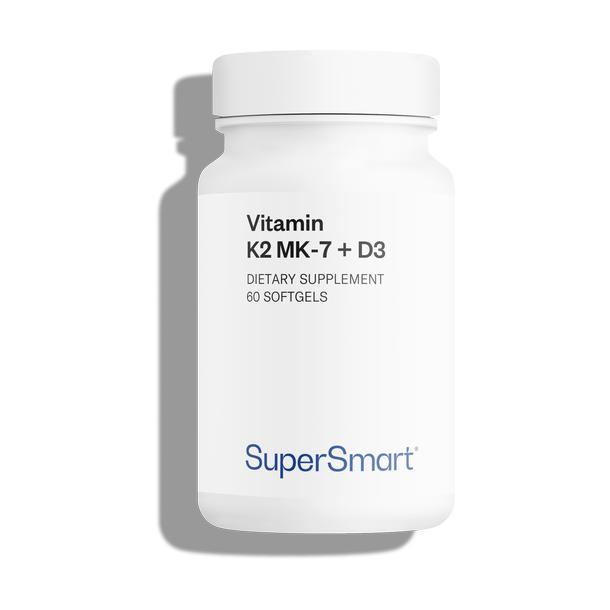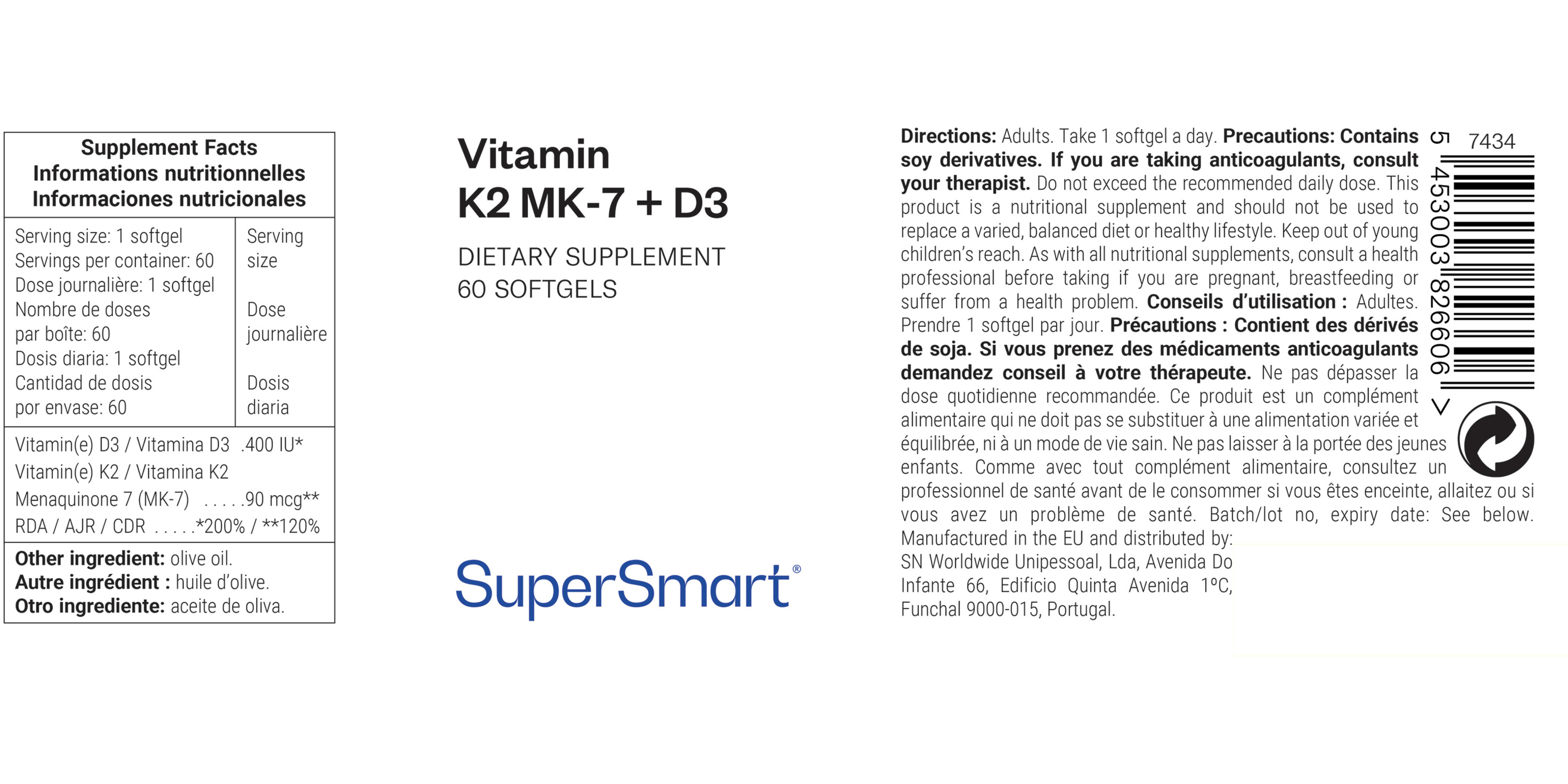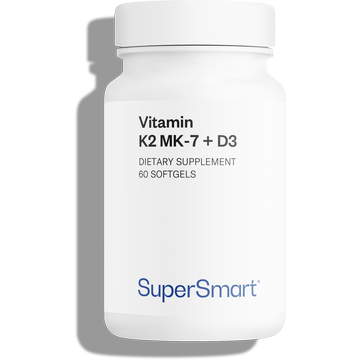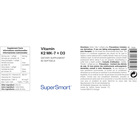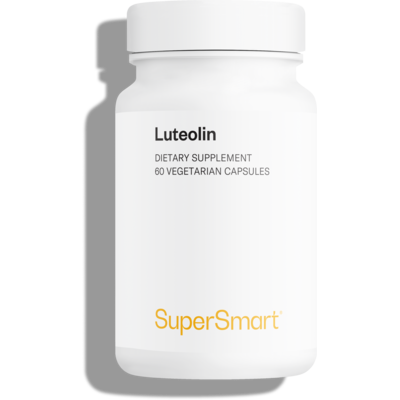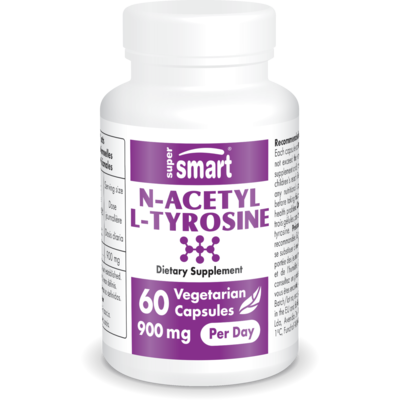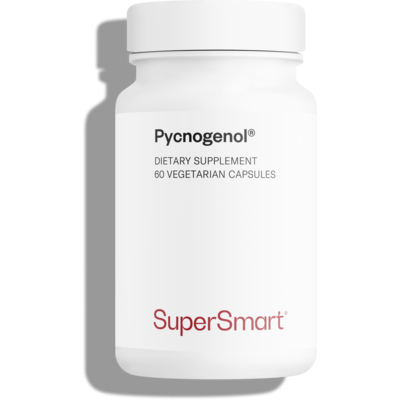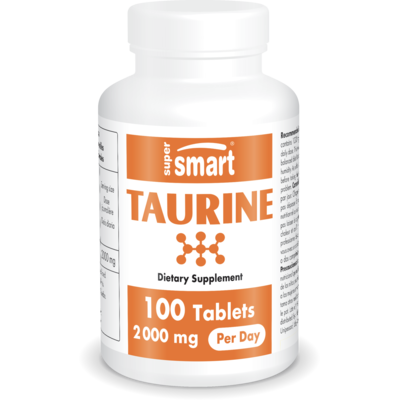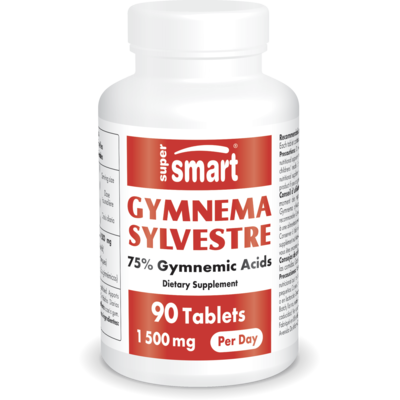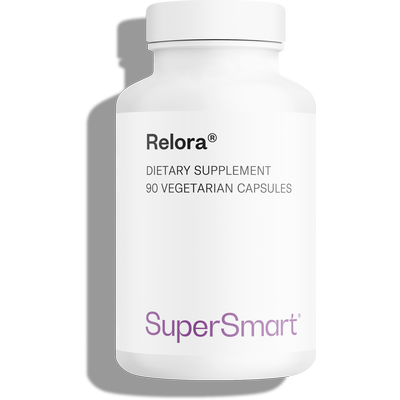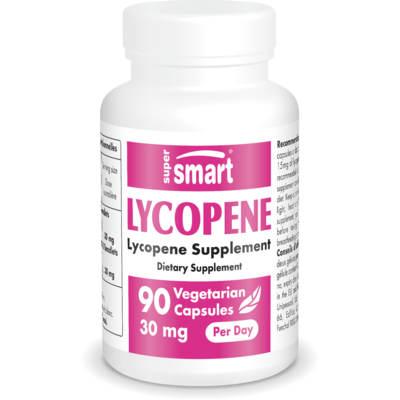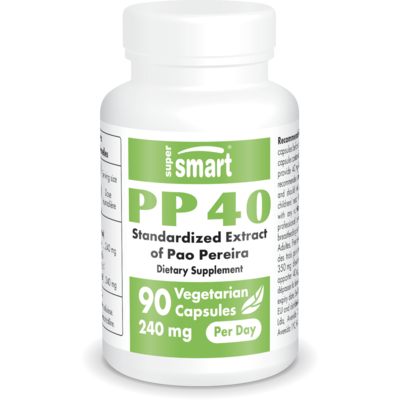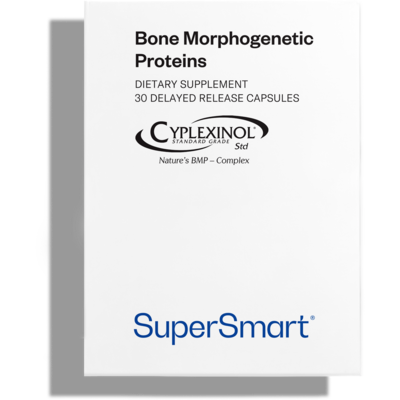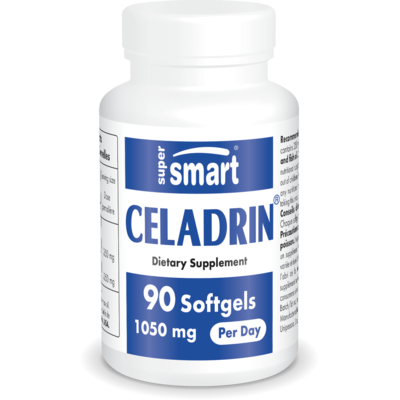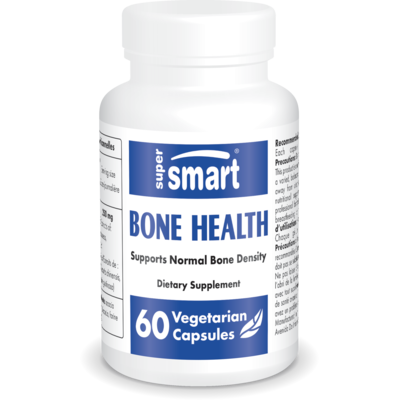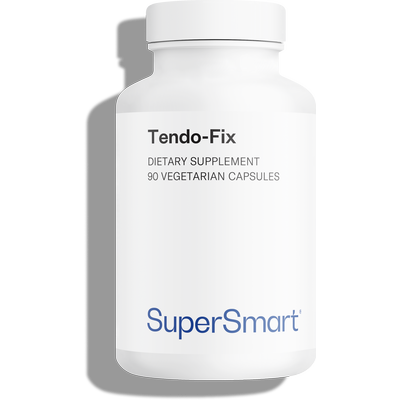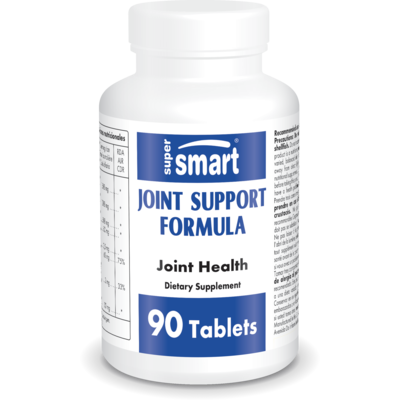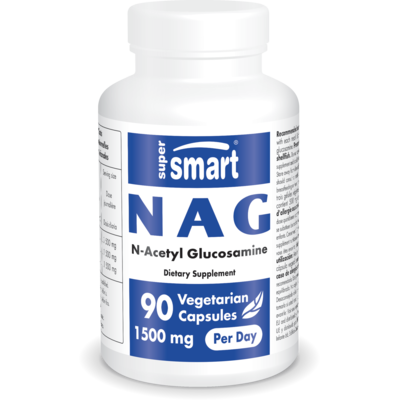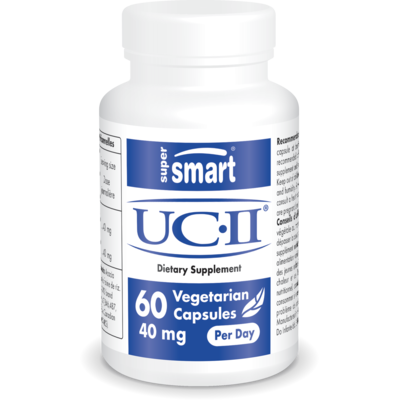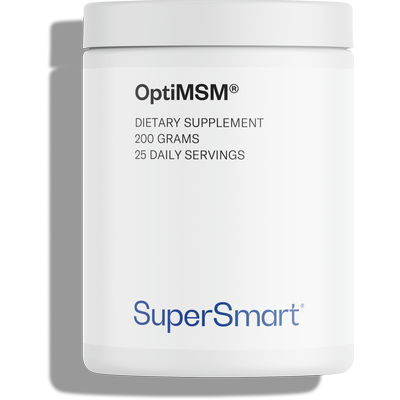Create your offer
MK-7 90 mcg + Vitamin D3 is a vitamin K supplement that contains vitamin k2 and D3. These elements facilitate the absorption and transport of calcium in the bone system, now available to buy at SuperSmart.
Who Might Benefit from MK-7 90 mcg + Vitamin D3?
Scientists at the University of Maastricht demonstrated recently that even many healthy people are deficient in vitamin K and that supplementing with vitamin K2 may be beneficial for those aged over 40. 90 mcg of MK-7 a day, equivalent to 15 g of natto, has been established as a beneficial daily dose, to be taken with a meal containing other fats for better absorption, even though the softgels are already composed of linseed oil, recognized for its high content in alpha-linolenic acid, an essential fatty acid and the top omega-3. Vitamin K2 itself is non-toxic. However, given its effectiveness as a coagulant, it is advisable to consult a health professional before taking it alongside anti-coagulants.
Such is the potential of vitamin K2’s health benefits; like vitamin D3, it can be considered as one of the major nutritional supplements of recent years. The addition of vitamin D3 to this complex facilitates the absorption and transport of calcium in the bone system. It significantly boosts the effect of menaquinone-7 by improving bone formation and bone mineral density in menopausal women whether or not they have osteoporosis. These two substances therefore act synergistically. In addition, recent studies have shown that vitamin D3 helps support pancreatic activity and carbohydrate metabolism and that it provides effective support for immune function.
A single daily dose of MK7+D3 makes an essential protective nutritional supplement for people who have increased risk of bleeding, intestinal malabsorption (Crohn’s disease, celiac disease, chronic diarrhea…), elderly people, osteoporosis, and risk of cardiovascular disease and cancer.
What is Vitamin K?
The term vitamin K encompasses various substances which are derived from the 2-methyl-1.4-naphtoquinone nucleus or menadione and which are involved in activating certain coagulation factors. There are two natural, non-toxic forms which are distinguished by their side-chain:
- Phylloquinone or phytomenadione (vitamin K1) is produced by plants, particularly green leafy vegetables (cruciferous vegetables such as cabbage, parsley, spinach, and lettuce). It is fat-soluble and heat-stable but sensitive to light and alkaline environments.
- Menaquinones (vitamin K2) are produced by bacteria in the intestinal tract, but instead of being distributed in blood vessels, bones, and various tissues, they are unfortunately completely eliminated from the body in feces. These K2 vitamins are also found in offal, meat, fermented products such as some cheeses, and in particular natto, a traditional Japanese food made from fermented soy beans, by far the richest source of vitamin K2 but not part of most Western populations’ daily diet.
What are the Benefits Associated with Vitamin K and K2?
Vitamin K
Vitamin K is so called because of its effect on 'Koagulation' (from the German). After being taken up by lymphatic vessels, it is formed into chylomicrons and accumulates in the liver where it has a role in synthesizing four coagulation factors including factor II (prothrombin) and its conversion into thrombin.
- It activates the synthesis of osteocalcin, a specific bone tissue hormone produced by osteoblasts. It thus ensures bone mineralization by capturing and distributing calcium in the body, to bones and teeth.
- It also helps keep it moving, driving it out of the arteries and soft tissue, which protects the latter from future calcification, such as atherosclerosis and aortic calcification.
- It also supports healthy kidney function by preventing calcium kidney stones.
- Supplementing with vitamin K can, therefore help reduce osteoporosis-related injuries, such as fractures (of the hip, for example), and in particular, protect against calcification of arteries.
Vitamin K2
Vitamin K2 is also one of the most effective preventive agents against chronic inflammation, which can gradually and silently damage tissue and thus contribute to the development of closely-related health issues and diseases: obesity, cancer, and cardiovascular disease (by reducing strokes and heart attacks).
- Studies have shown that vitamin K2 combats inflammatory processes by inhibiting pro-inflammatory markers produced by monocytes.
- Of the menaquinones that make up vitamin K2, menaquinone-7 or MK-7 extracted from natto, is the fraction with the highest bioavailability and activity. Menaquinone-7 has been used in Japan since 1995 to protect and strengthen bones and joints.
- Research has shown that it regulates calcium production by activating a specific protein responsible for optimizing the binding of calcium to bone structure which is essential for bone solidity.
- It also activates a protein which prevents calcium from being deposited on blood vessel walls, thus supporting cardiovascular health.
What do Studies Show About Vitamin K?
- According to a recent Spanish study involving more than 7,000 participants over a period of approximately 4.8 years, individuals who increased their vitamin K consumption (phylloquinone and menaquinone) had a lower risk of cancer and all-cause mortality than those whose intake fell or remained unchanged.
- Researchers concluded that an increase in daily vitamin K intake is associated with a lower risk of cardiovascular disease, cancer, and all-cause mortality in a Mediterranean population at higher risk of cardiovascular disease.
- A one-year Japanese study of women over 65 with Parkinson’s disease found that supplementing with vitamin K at 45 mcg a day reduced the incidence of hip fracture and slightly increased bone density compared with a placebo group.
- A more recent study has shown that vitamin K2 may even have a preventive effect against Parkinson’s because it acts as an electron transporter, maintaining normal ATP levels in the mitochondria.
Buy MK-7 90 mcg + Vitamin D3 to facilitate the absorption and transport of calcium to the bone system.
WARNINGS
Do not exceed the recommended daily dose. This product is a nutritional supplement and should not be used as a substitute for a varied and balanced diet or a healthy lifestyle.
STORAGE
Store in a cool, dry place away from direct sunlight, heat, and humidity. Keep out of reach of children.
PREGNANCY AND MEDICAL CONDITIONS
If you are pregnant, breastfeeding, or have any medical conditions, consult your healthcare provider before using this product.
SUPPLEMENT INTERACTIONS
Consult your healthcare provider before use, especially if you are taking any medications or other supplements as there may be potential interactions.
Need help?
Phone
+1 (786) 522-3907
From 9 am to 6 pm (EST)
You may also like

